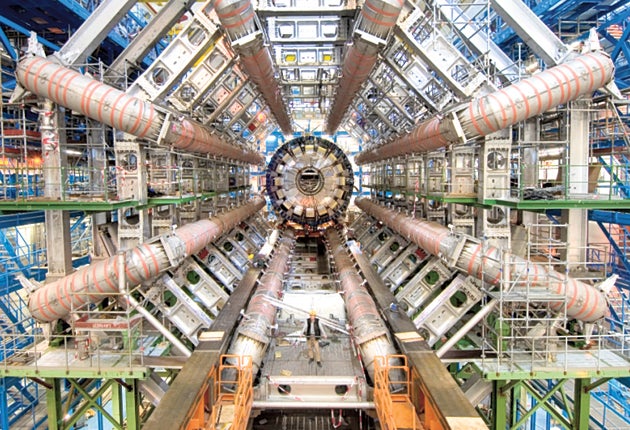What does the 'God particle' sound like?
Coins jangling in a wine glass, say the scientists hunting the elusive Higgs boson

Who would have thought that the sound of God would be so whiney? Scientists working at the Large Hadron Collider in Switzerland say they have simulated the noise that might be made when a Higgs boson particle – nicknamed the "God particle" – comes into being. And to the untrained ear it sounds a little bit like a bunch of coins spinning in a wine glass.
The Holy Grail of the £6bn collider is to eventually produce a Higgs boson, the elusive, hypothetical particle which supposedly gives mass to other particles and will help scientists understand how the universe's first atoms came into existence.
To find the Higgs boson, an international coalition of physicists has constructed the world's largest particle accelerator on the Swiss-Franco border, where beams of protons will be smashed into each other over 27km of tunnel deep in the Alps.
But while a physical Higgs boson has yet to be created, scientists have used computer programs to model what it might look like. Now, using data gathered from those models, they have attempted to map sound to it – in a process called "sonification" – to help scientists listen out for a Higgs boson if and when it is successfully produced.
Sonification works by attaching sound to data. One of the simplest examples is a Geiger meter, which uses increasingly frequent, audible blips to alert someone to how much radioactive material there is around them.
Scientists at LHC Sound, a collaboration of particle physicists, musicians and artists in London, have converted data expected from collisions into sounds. They do so by matching quantifiable data such as pitch and volume to the momentum and energy that a particular particle gives out. Dr Lily Asquith, who models data for the collider and has worked on the sound project, says attaching noise to a particle will help physicists "listen to the data" and pick out the Higgs particle if and when they finally detect it.
"Sound seems the perfect tool with which to represent the complexity of the data," she wrote on her blog.
"Our ears are superb at locating the source and location of sounds relative to one another; we can hear a vast range of frequencies and distinguish timbres (different instruments) before they have even played a full cycle. We also have an incredible ability to notice slight changes in pitch or tempo over time and to recognise patterns in sound after hearing them just once."
Richard Dobson, a composer who has helped map the sounds, said he was surprised by the melodies that particle data produced. "We can hear clear structures in the sound, almost as if they had been composed," he told BBC News.
"They seem to tell a little story all to themselves. They're so dynamic and shifting all the time, it does sound like a lot of the music that you hear in contemporary composition."
Scientists around the globe are in a race to find the Higgs boson, with the particle accelerator in Switzerland being the largest experiment of its kind.
Two smaller colliders in the United States – the Tevatron in Illinois and Relativistic Heavy Ion Collider in New York state – are being used in an attempt to find similar pre-atomic particles in an effort to understand how the universe came into existence.
The Large Hadron Collider has been beset by difficulties since its launch in September 2008. It had to be shut for repairs after two weeks' running time and last year it stalled when a piece of a baguette was found in a cooling unit.
To hear the God particle go to: www.lhcsound.moonfruit.com/#/sounds-library/4540255106
Join our commenting forum
Join thought-provoking conversations, follow other Independent readers and see their replies
0Comments